Friday, August 26th, 2016
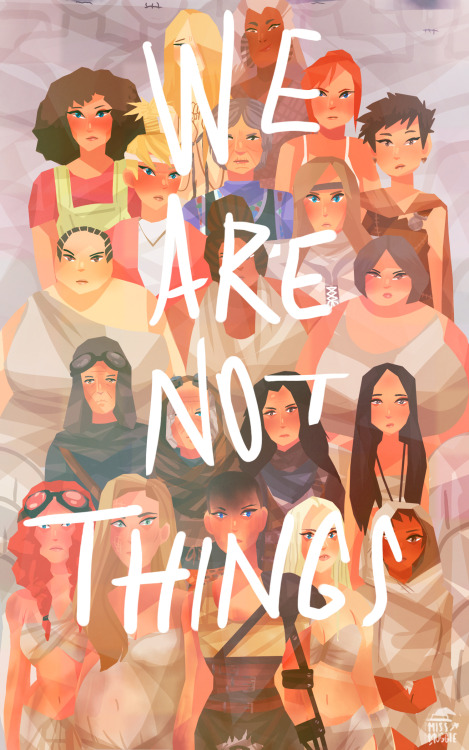

missmuggle:
“WE ARE NOT THINGS”
My piece for furyroadfanzine and the no text one, BECAUSE I SPENT A LOT OF TIME DRAWING ALL OF THEM
Reposted from http://ift.tt/2bSV6As.
Tags: fury road, mmfr, we are not things. Posted in Tumblr by jbc | Permalink | No Comments »
Saturday, June 27th, 2015










fury road: eyes
Reposted from http://ift.tt/1LC4LJo.
Tags: gifs, my gifs, fury road, mmfr, mad max, charlize theron, nicholas hoult, eyes, tom hardy, hugh keays-byrne, riley keough. Posted in Tumblr by jbc | Permalink | No Comments »
Monday, June 22nd, 2015
“
Miller’s purpose was to tell an honest story, and he let nothing else get in the way of that. Not even the male gaze.
I’m just going to drop this quote from him in, because it relates to the same thing, “it couldn’t be a man taking five wives from another man. That’s an entirely different story.”
There’s words and there’s action; Miller may not label himself a feminist, may not have set out to make a feminist movie, but he put his ideas and dreams and heart and soul into this impossible movie. And that heart and soul says he respects women deeply; he respects them enough to understand that a man taking wives away makes it a different story. The movie is so consistently insistently precise that even if he says he didn’t mean to, I can see it.
If someone says they respect me as a person but cannot stop staring at my ass, I can see it. Does it matter if they “deliberately” look at my ass?
Actions matter.
”
– bonehandledknife, from Filmmaking Intent v. Film Theory
Reposted from http://ift.tt/1LgmN2S.
Tags: fury road, mmfr, meta, text post, george miller. Posted in Tumblr by jbc | Permalink | No Comments »
Thursday, June 11th, 2015


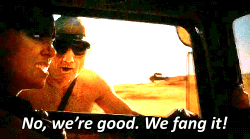
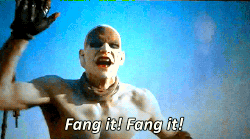
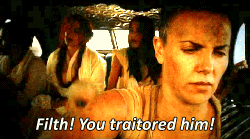
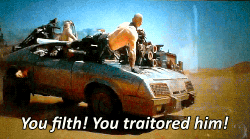
Favorite world-building elements: Language
Reposted from http://ift.tt/1C21YRd.
Tags: world-building, gifs, my gifs, fury road, mmfr, mad max, tw: choking. Posted in Tumblr by jbc | Permalink | No Comments »
Tuesday, June 9th, 2015



Favorite world-building elements: Limited exposition
When introducing another one of my favorite movies, Kevin Smith said:
It doesn’t give a shit whether you know what’s going on or not. It dumps you right into the middle of an existing universe that things have happened in before, and the movie accepts the fact that hey, our audience might be bright enough to catch up.
That’s what Fury Road does.
Reposted from http://ift.tt/1JH7XkM.
Tags: fury road, mmfr, mad max, exposition, no one in this movie ever stops what they're doing, to explain the world to another character, why would they?, they live there, give the audience 2+2, not 4, thank you george miller. Posted in Tumblr by jbc | Permalink | No Comments »
Friday, June 5th, 2015
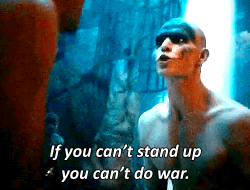




Favorite character traits: SLIT BEING A DICK
Reposted from http://ift.tt/1Kg7d6U.
Tags: spoilers, gifs, my gifs, fury road, mmfr, slit, mad max, josh helman, precious homicidal warbaby slit. Posted in Tumblr by jbc | Permalink | No Comments »
Thursday, June 4th, 2015


Favorite world-building elements: Realistic depiction of trauma
One of the things that makes Fury Road so immersive is the way it presents the result of violence. Unlike movies in which characters shrug off what in the real world would be horrific injuries*, the inhabitants of the Wasteland experience the full effect of the bad things that happen to them.
Some examples:
- Angharad’s graze wound. When Max shoots The Splendid Angharad in the leg, we see a close-up of the injury. When Furiosa asks her how it feels, she says, “It hurts,” and it apparently is a factor in her subsequently slipping from the war rig and being crushed. In the world of Fury Road, even a relatively minor injury can have severe consequences.
- Avoidance of gratuitous on-screen gore. At the same time, the film avoids depicting injuries just to be shocking. When Angharad is dying and Immortan Joe orders her cut open to try to save the fetus, we see the scene unfold – but we don’t see the actual procedure. The movie only shows enough for us to understand what’s happening. That restraint reflects a maturity in how the film approaches trauma that contrasts with the adolescent gross-out porn of other action movies.
- Realistic emotional responses. The inhabitants of the Wasteland carry both literal and figurative scars of past experiences. Angharad has a history of self-harm. Max exhibits a degree of PTSD that leaves him unable to speak. I ship Max/Furiosa, and there’s a side of me that wants to believe there were sexy fun times in the back of the war rig during that one chance Nux and Capable had, but I appreciate that the film respects its characters and what they’ve been through enough not to force them into emotionally false situations.
- Furiosa’s chest wound. When Furiosa is stabbed with the gear-shift dagger, we see the pain of it in her face. Especially given how stoic she’s been up to this point, the increasingly desperate look in her eyes during subsequent events shows the effect it is having on her. Unlike less-realistic movies, where such an injury might lead to a) a quick clichéd death scene with a few coughs of blood, an exhortation or two, and boom, dead, or conversely b) lots of ass-kicking followed by a wince and some light-hearted banter in the denouement, Furiosa’s injury follows a steady and clinically realistic progression through increasing distress and eventual loss of breath function due to tension pneumothorax. That the true emotional climax of the movie centers on an act of healing, as Max decompresses her chest and then treats her subsequent exsanguination with a transfusion of his own blood, is a beautiful inversion of action-movie tropes.
George Miller financed the original Mad Max with his earnings as an ER doctor, and made the movie in part to explore the effects of trauma on people who encounter lots of it. Although he hasn’t worked as a physician in many years, his experience clearly still informs his approach to storytelling, and adds greatly to the believability of Fury Road.
*No disrespect to Holy Grail. That shit’s hilarious.
Reposted from http://ift.tt/1H5l8vm.
Tags: spoilers, world-building, gifs, my gifs, fury road, mmfr, mad max, george miller. Posted in Tumblr by jbc | Permalink | No Comments »
Sunday, May 31st, 2015

I saw Fury Road again today. This was in a better theater in 3D; I figured I should give that a try even though I’m a curmudgeon who usually avoids it.
It was so worth it. :-)
Besides the visuals, I was able to hear things I hadn’t heard the first two times. Like this: After the lancer on the war rig’s fuel pod chromes himself and shouts “witness me!” before leaping onto the Buzzards vehicle, you hear a chorus of war boys shouting “witness!” in response to his sacrifice. But there’s also one shout of “mediocre!”
Which was hilarious, but so perfect. Because in the hyper-masculine war boy culture, there’s always going to be That One Guy.
Reposted from http://ift.tt/1BAqYPo.
Tags: fury road, mmfr, mad max, war boys, mad max spoilers, mediocre. Posted in Tumblr by jbc | Permalink | No Comments »
Friday, May 29th, 2015




W I T N E S S M E
Reposted from http://ift.tt/1SHKMej.
Tags: gifs, my gifs, fury road, mmfr, mad max, war boys, witness me. Posted in Tumblr by jbc | Permalink | No Comments »
Friday, May 29th, 2015





Favorite world-building elements: The V8 salute
Reposted from http://ift.tt/1BuDIa7.
Tags: world-building, gifs, my gifs, fury road, mmfr, v8 salute. Posted in Tumblr by jbc | Permalink | No Comments »
Thursday, May 28th, 2015


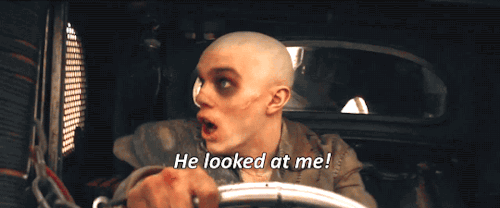
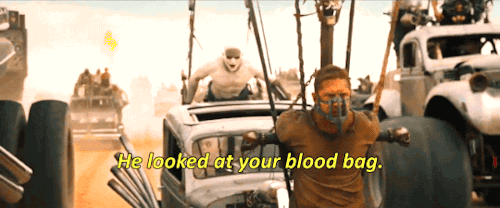
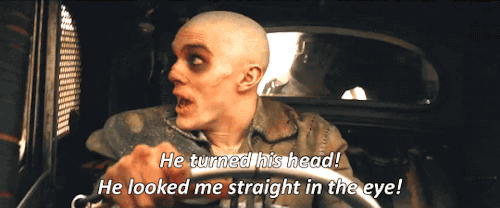





N U X + S L I T: precious homicidal warbabies.
Reposted from http://ift.tt/1FRe5pp.
Tags: gifs, my gifs, fury road, mmfr, nux, slit, precious homicidal warbabies. Posted in Tumblr by jbc | Permalink | No Comments »
Wednesday, May 27th, 2015
The Vuvalini | A Working Library:
There’s been some discussion of whether or not Fury Road is a feminist film, whether its unabashed celebration of violence and death preclude that label, or whether its admittedly extreme presentation of misogyny and literal smash-the-patriarchy plot device make it too facile to perform feminism. I’ll confess I’m not moved by either argument: feminism, like any political viewpoint, can be just as capably communicated via hyperbole as more subtle forms. And while feminism and non-violence have a long history, feminism is hardly a subset of pacifism—one does not need to be a pacifist in order to be a feminist. Not to mention that any work of art sufficiently good enough to warrant criticism is likely to be complicated enough that a straight up declaration of “yes, this is feminist” or “no, it isn’t” won’t be trivial.
The more interesting question is not whether or not the film is feminist but whether it furthers feminism: whether, via plot or character or camera it furthers the ideas of feminism.
To that I answer a resounding yes.
Reposted from http://ift.tt/1FZBaYS.
Tags: feminism, fury road, mmfr, mandy brown. Posted in Tumblr by jbc | Permalink | No Comments »
Wednesday, May 27th, 2015
Tags: gifs, my gifs, furiosa, fury road, mmfr. Posted in Tumblr by jbc | Permalink | No Comments »